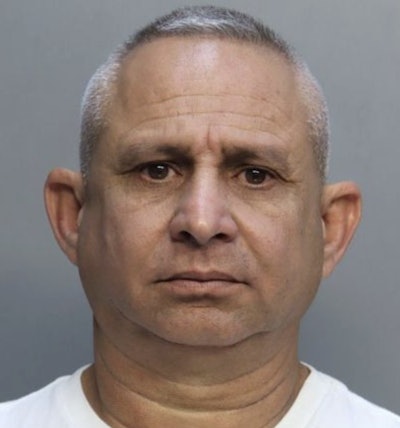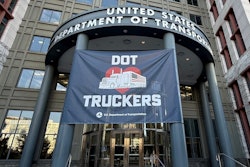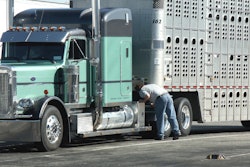Trucking news and briefs for Tuesday, Sept. 16, 2025:
- VIN falsification, theft: Florida-based small fleet owner arrested and charged.
- Local government leaders get out ahead of Congressional attempts to boost truck size/weight limits.
- Multimodal coalition aims "to accelerate the deployment of innovative technologies that modernize the future of freight movement and commercial delivery."
Florida fleet owner arrested for alleged role in commercial vehicle theft operation
Leonel Diaz Pairol, 54, the owner of Hialeah, Florida-based EZH Transport Inc., has been arrested and charged for his alleged role in a criminal enterprise involving stolen commercial vehicles, fraudulent vehicle identification numbers and falsified title documentation spanning several counties in south Florida.
 Leonel Diaz PairolFlorida Department of Agriculture and Consumer Services
Leonel Diaz PairolFlorida Department of Agriculture and Consumer Services
“The theft of commercial trucks and trailers is not a victimless crime -- it drives up the cost of goods and services for every Floridian,” Simpson said. “Thanks to the diligent work of our Office of Agricultural Law Enforcement, a major player in a sophisticated vehicle theft and fraud operation has been taken off the streets. We will continue to aggressively investigate and disrupt criminal enterprises that target Florida’s businesses, consumers, and supply chains.”
In 2023, OALE received a referral regarding a criminal enterprise involved in the trafficking of stolen property, fraudulent VINs, and falsified title documentation across south Florida.

Over the course of the investigation, OALE Special Agents identified a semi-trailer bearing a counterfeit VIN and fraudulent paperwork. The trailer was intercepted in Immokalee, Florida, during a traffic stop and was linked to EZH Transport, owned by Diaz Pairol. Further review revealed that OALE had previously seized three VIN-swapped semi-tractors from Diaz Pairol and EZH Transport. Title histories confirmed that falsified documents and fraudulent rebuild inspection records were submitted in connection with these vehicles.
Further inquiries revealed that Diaz Pairol was associated with multiple fraudulent semi-truck rebuilds, including a Freightliner tractor valued at approximately $140,000 that had been reported stolen from Miami-Dade County. Fraudulent title applications, falsified repair records, and VIN alterations were systematically used to conceal stolen vehicles, Simpson said in a press release.
On Sept. 8, OALE Special Agents arrested Diaz Pairol in connection with this enterprise. He was transported to the Miami-Dade Turner Guilford Knight Correctional Center pending judicial proceedings.
He was charged with the following felony offenses:
- Three counts Title Fraud/False Statements, 3rd-degree felony
- Three counts Possession of Altered VIN, 3rd-degree felony
- Three counts Obtaining Title with Fraudulent Documents, 3rd-degree felony
- One count Dealing in Stolen Property, 2nd-degree felony
[Related: ECM theft ring busted in Florida]
Group launches campaign against heavier truck limits
More than 2,200 local government leaders countrywide are pressing Congressional lawmakers to oppose increases in commercial truck size and/or weight, including heavier single-trailer trucks.
A joint letter, organized by the Coalition Against Bigger Trucks (CABT) and delivered to Congressional leaders Monday, is co-signed by county and municipal officials, as well as public works directors and county engineers from all 50 states.
"Much of our transportation infrastructure that connects people to jobs, schools and leisure is in disrepair, in part because local and rural roads and bridges are older and not built to the same standards as interstates," according to the coalition letter. "The impacts of heavier or longer tractor-trailers would only worsen these problems."
Legislative efforts to increase commercial truck weight limits have popped up in recent history and have traditionally been opposed by trucking stakeholders. The Owner-Operator Independent Drivers Association (OOIDA), Truckload Carriers Association (TCA), and the industry's largest labor union, the Teamsters, in 2023 opposed H.R. 3372, which would have established a 10-year pilot program allowing a gross weight of up to 91,000 pounds for certain six-axle trucks, or the maximum permitted by bridge formulas. States, even those that already allow gross weights of more than 80,000 pounds, would have had the ability to opt in or out of the program, but the measure never advanced past the House.
Those same groups in April of this year maintained their position against an increase in testimony to the House Committee on Transportation & Infrastructure.
[Related: DOT’s study on truck size and weight contains little fresh news]
CABT asserts that shipping companies are currently pushing numerous proposals to raise the allowable federal weight limit on trucks from 80,000 pounds and attempting to attach the proposals to the next highway funding bill.
These proposals, CABT claims, include a pilot program for 91,000-pound trucks to assess their crash rating and a provision allowing log trucks weighing up to 154,000 pounds. Also included, the group said, is a proposal that would give governors control over setting interstate weight limits in their states, creating a patchwork of state weight limits that would be devastating to interstate commerce.
Many states have already undertaken commercial truck weight adjustments or have considered them. This legislative session, for example, Alabama considered a bill that included a per-axle weight increase for log trucks. The bill ultimately passed, but not before the weight increase was removed.
Studies have shown heavier and longer trucks damage infrastructure, especially bridges, and the U.S. Department of Transportation recommended against any such increases in its 2016 Comprehensive Truck Size and Weight Limits Study.
A recent study by CABT concluded that more than 68,000 local bridges would be put at-risk by 91,000-pound trucks, five-and-a-half tons over the current weight limit. The study found cost to replace those bridges is more $78 billion, which would be borne by state and local governments. None of the various proposals to increase truck weight includes any additional funding for infrastructure.
Size and weight issues came up in a Senate subcomittee hearing aimed at airing trucking issues ahead of the next highway reauthorization in July. Sit in on that discussion via Overdrive Radio in the podcast embedded below:
[Related: Industry details challenges to House subcommittee]Multimodal group established to modernize freight movement
A new public-private partnership was established this month with the goal of advancing a more resilient, efficient, and interconnected freight system.
Advanced Freight Partners Group (AFPG) will include leaders from trucking, maritime, and rail, and will be charged with developing and implementing practical and scalable strategies (operational and policy-driven) "to accelerate the deployment of innovative technologies that modernize the future of freight movement and commercial delivery."
By value, more than four times as much freight moves by truck than by its nearest competitor, rail, but all modes are dependent on one another to some degree.
At its launch, the AFPG, led by the Electrification Coalition (EC), consists of 45 partner organizations representing freight stakeholders and industry, government, and non-governmental organizations. The American Trucking Associations, the North American Council for Freight Efficiency (NACFE), and Volvo Group North America are among the group's founding members.
“The AFPG is about improving goods movement, not just deploying technologies," said EC Executive Director Ben Prochazka. "It’s about how we come together across industry lines to build smarter infrastructure, ensure consistent access to energy and fuels, reduce the cost of innovative technology solutions, and support commercial success.”
The AFPG is a first-of-its-kind multimodal collaboration that Prochazka expects will increase the U.S. freight sector’s global competitiveness, drive operational efficiencies, align industry efforts in pursuit of national and economic security priorities, and rapidly deploy advanced freight technologies, "allowing the United States to take a leading role in the future of freight."
The group says its founding was "a response to what we’re hearing and seeing across the sector,” its website says, including:
- The need to break down silos between freight modes, sectors, and technologies
- Deploy solutions and advanced freight technologies that drive down costs, improve efficiency by utilizing advanced fuels and powertrains, and enhance reliability
- Hold strategic, business-led conversations focused on accelerating the deployment of advanced vehicle solutions and infrastructure in key areas across the country
- Develop and amplify best practices across the freight ecosystem and elevate programs and projects across the country that demonstrate success









